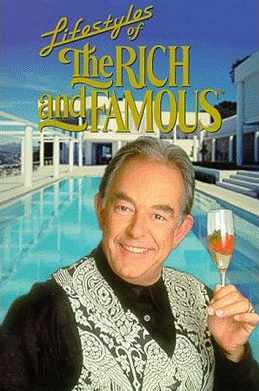In the 1980s, there was no better example of just how much these years had earned the nickname “the decade of excess” than a certain series on CBS called Lifestyles of the Rich and Famous, which first aired in 1984 (how Orwell could leave this show out of his portrait of dystopia is unclear, but to his credit, there was Britishness involved). Arguably chosen to host on the sole basis of his “posh” British accent alone, Leach brought the average American Joe into the homes of such now especially dated stars as Estelle Getty, Patrick Swayze and Sophia Loren. Each episode also concluded with what would become his signature phrase, “champagne wishes and caviar dreams”–infusing his viewer with a taste of what could be theirs if only they weren’t such lazy middle class fucks sitting on their couch all the time.
Just shy of his seventy-seventh birthday on August 29th before entering the ultimate VIP pearly gates on the 23rd, Leach was the premier symbol of what it meant to want to gain access to a higher status, of the conviction that just being made privy to how the wealthy lived meant that, by proxy, you were still somehow partaking of the American dream. The ability to buy into an ideal you yourself couldn’t possibly afford. Even so, the mere evidence that someone who grew up as poverty-stricken and foreign as, say, Loren was enough to get the lower and so-called nouveau riche classes “motivated.” That is, motivated to keep going to their mundane and menial jobs with the faint hope that somehow, someday, maybe they, too, could aspire to ascend to such heights. After all, even Tony Danza could. A man as “unassuming” as that. Surely, it could just as easily be your collar’s turn to change from blue to white as well with one happenstance stroke of luck.
That the entire subsidization of the show was provided by name checking resorts and other emblems of luxury in order for the exchange of free services for free promotion to occur (something that only the glory days of the 80s and 90s seemed to know the value of in that highly beneficial quid pro quo sense) was a testament to just how much people wanted to vicariously experience “the good life”–that thing that we as Americans were constantly taught to covet and go in search of via the capitalistic system (now very much defunct despite J. Lo ignoring it) our whole lives no matter how out of reach or how impossible. To go after the “American dream” of comfort and decadence was to be a true American.
In the present, however, these pursuits are just a further sign of how wrong we’ve gone and why we’re trapped in a Boschian spectacle. That Leach was once the man responsible for paying $10,000 to buy a picture painted by Britney Spears for the purpose of ensuring a benefit in Las Vegas went off without a hitch is one of many indications of his lifelong commitment to financial gluttony. Alas, as denizens of a decade called not the 80s, and a century called not the twentieth, we can feel no affection for the aims and passions of a man who said, “Nobody would watch Lifestyles of the Poor and Unknown.” It’s true, perhaps, but these days it feels like we’re all the stars of a reality show adaptation called How the Other Half Lives. And there’s nothing assuring or motivating about looking to those few who live in the style illuminated by Leach, who lit the way for other lifestyle shows that would not age well, like MTV Cribs, My Super Sweet Sixteen and The Fabulous Life of…
In 2018, all anyone wants to see is how terrible your life is so they can know they’re not alone, nor are they the only ones who will never dip their toe into a pool filled by anything other than cess. So rest in peace, sweet English emblem of a bygone era of at least wanting to believe in wealth as a worthy and attainable god.





















